|
23 April, 2016
Symposium organized for Commemoration of the 26th Anniversary of Promulgation of the Basic Law
In order to commemorate the 26th anniversary of the promulgation of the Basic Law of the Hong Kong Special Administrative Region of the People’s Republic of China, the Joint Committee for the Promotion of The Basic Law of Hong Kong organized the Symposium in Commemoration of the 26th Anniversary of the Promulgation of the Basic Law of the HKSAR which took place on 23 April at Eaton Hotel Hong Kong. Dim Sum TV was invited to attend and witness such a grand occasion related to the Basic Law.
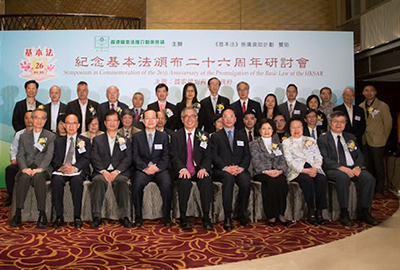
The theme of the symposium is “The System of the State and the International Vision”. The guests invited to officiate the event were Mr Rimsky Yuen Kwok-keung, Secretary for Justice of the HKSAR and Mr Yang Jian, the Deputy Director of the Liaison Office of the Central People’s Government in the HKSAR.
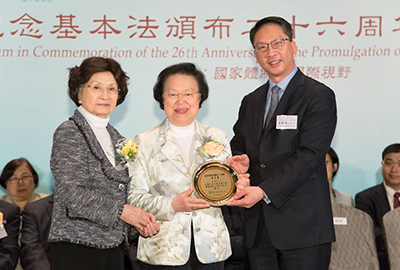
Mr Rimsky Yuen Kwok-keung, the Secretary for Justice presents a souvenir to Ms Maria Tam Wai-chu (middle), a Hong Kong deputy to the National People's Congress
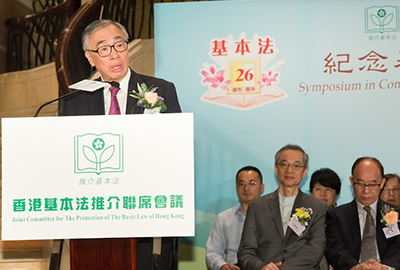
Mr Joseph Lee, Chairman of the Joint Committee for the Promotion of the Basic Law of Hong Kong delivers a speech
Mr Joseph Lee, Chairman of the Joint Committee for the Promotion of The Basic Law of Hong Kong, pointed out in his speech that in recent years in Hong Kong, there had been lots of incidents and discourses emerged in the name of civil disobedience which had undermined the solid foundation of the development of Hong Kong laid in the past several decades. He said that in the 19 years since the handover, the Basic Law has provided the systematic framework for the “One Country, Two Systems” and “Hong Kong people ruling Hong Kong”, which has safeguarded Hong Kong’s economy, society, rule of law and livelihood.
He explained that under the framework of the Basic Law, Hong Kong was an indispensable part of China; and Hong Kong, which practiced high degree of autonomy under the “One Country, Two Systems”, was linked with China but also enjoyed a different system and that benefited the consolidation of its status of being an international financial centre.
Responding to the theme of the Symposium, Mr Lee considered that Hong Kong should take care of its own positioning and advantages so as to tie in with China’s “Belt and Road ”initiative which is providing Hong Kong with hard-to-come-by opportunities of collaborating with the Pearl River Delta and thus injecting energy to Hong Kong’s economy.
He emphasized that if we are to defend Hong Kong’s core values and guarantee Hong Kong’s stability and prosperity, we must have an in-depth understanding of the Basic Law as well as Hong Kong people’s rights and duties prescribed by the Basic Law. According to Mr Lee, Hong Kong needs to function as a civilized society and we should thoroughly adhere to the principle of the “One Country, Two Systems” , respect China as our nation , understand the differences of the two systems, be rational and be in solidarity and mutual help with China.
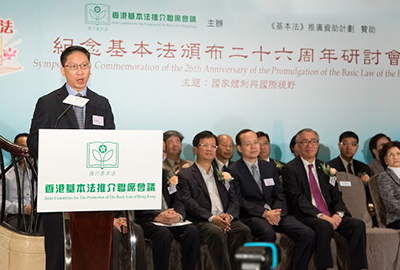
Mr Rimsky Yuen Kwok-keung, the Secretary for Justice, delivers a speech
Mr Rimsky Yuen Kwok-keung, the Secretary for Justice, shared his own views from looking at the history, background and relevant provisions of the Basic Law.
Mr Yuen said that according to the preamble of the Basic Law, the establishment of the HKSAR not only supported China’s unification and territorial integrity but also maintained Hong Kong’s prosperity and stability, which enabled Hong Kong to realize fully its characteristics of being an international city and gain international recognition that Hong Kong has been ranked as the world’s freest economy by the American Heritage Foundation 22 years in a row.
He pointed out that the “One Country, Two System”, which was a scheme conceived taking into the consideration Hong Kong’s real situation, was absolutely visionary from the international perspectives. Therefore, the HKSAR in the future should make avail of the advantages provided by the “One Country, Two Systems”, respect the differences of the two systems and show the synergy of the “Two Systems”. According to Yuen, Hong Kong should on the one hand adhere to and magnify the uniqueness of being a special administrative region and enhance its competitiveness, while on the other hand she should contribute herself to the development of its country, China.
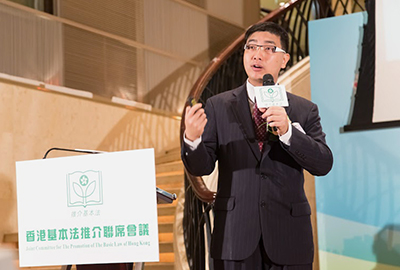
Dr Simon-Hoey Lee, the Visiting Fellow at the Centre for Comparative and Public Law, Faculty of Law of HKU explores relevant issues together with the guest
Part-time Researcher at the Law School of Tsinghua University and Visiting Fellow at the Centre for Comparative and Public Law, Faculty of Law of HKU, Dr Simon-Hoey Lee delivered his views on the theme of “Looking at the development of China’s national system and the ‘One Country, Two Systems’ from the perspective of Hong Kong identity”. He pointed out that identity stemmed from different factors and could not be taken for granted, and identity could be classified into cultural identity and national identity. After having been under colonial rule, the identity of Hong Kong people is mostly limited in cultural identity while political and national identity are very weak, according to Dr Lee.
Dr Lee considered that Hong Kong as a special administrative region, is a special place. However, such special character could not be magnified by comparison if it was not under the overall platform of the development of China’s national system as a basis. Therefore he urged Hong Kong people to try to understand more in-depth the legal basis of the “One Country, Two Systems” and the intricate relationship between the Basic Law and China’s Constitution.
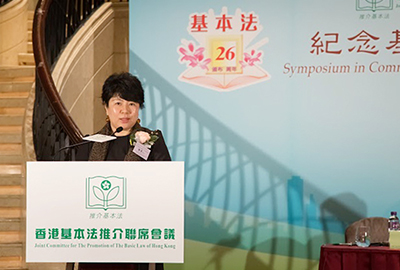
Ms Chen Wen, Director of the Policy Research Office from the Office of the Commissioner of the Ministry of Foreign Affairs of the People's Republic of China in the HKSAR, delivers a speech
Ms Chen Wen, Director of the Policy Research Office from the Office of the Commissioner of the Ministry of Foreign Affairs of the People’s Republic of China in the HKSAR, made her speech on the theme of “The Recent Development and Direction of China’s Foreign Relations”. She said that China as the world power had her speed and scope of development surpassed the expectaion of other countries since her opening up over 30 years ago and that is the reason why China’s foreign relations are facing complications and worries.
Ms Chen regarded that although there are now still conflicts between China and her surrounding countries, collaborations are imperative and unavoidable. She deemed that China has been upholding the peaceful diplomatic policy of self-independence, striving to establish partnership relations with other countries based on equality, consultation, mutual understanding and accommodation, and such a direction has brought apparent achievement in the foreign relations with those world powers such as Europe and the United States.
She added that the “Belt and Road” initiative had its historical significance and it also ties in with the development of the present era. According to Ms Chen, Hong Kong, as an international metropolis and a special administrative region of China, should capitalize on its own advantages and realize its own role, provide talents and resources to actively participate enthusiastically in the“ Belt and Road” initiative so as to assist China to take her foreign relations to a new stage.
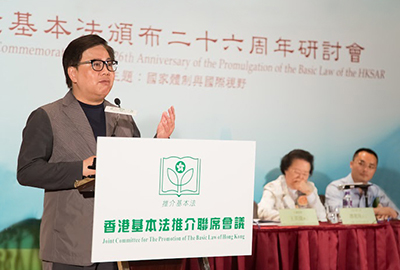
Mr Wilfred Wong Ying-wai, member of the Preliminary Working Committee for the HKSAR Preparatory Committee, delivers his speech
Mr Wilfred Wong Ying-wai, former Deputy to the National People’s Congress and member of the Preliminary Working Committee for the HKSAR Preparatory Committee, delivered his speech on the topic of “How can Hong Kong respond facing China’s Ever-going Development?” He said history has shown clearly that each autonomous region and its suzerain were bonded by common destiny, and Hong Kong people should take such a view when they face China. Hong Kong’s stability and prosperity can be maintained only if Hong Kong people understand the background and the present situation of the Basic Law and also comply with it.
Mr Wong boldly pointed out that the present economic development of Hong Kong could not catch up with China’s development direction, but he deeply believes that it would not be too late if Hong Kong people can capitalize on its own advantages and grasp the opportunities offered by the rise of China. He advised youngsters against being too progressive and radical, while adults should care for the next generation with experience and wisdom as well as the spirit of loving the motherland and Hong Kong, so as to build a bright future of Hong Kong.
The symposium attracted over 350 people from all sectors of the community to attend and delivered the message that only Only understanding the Basic Law and defending Hong Kong’s core value could Hong Kong well grasp the advantages brought by the Basic Law and be well developed.
|

